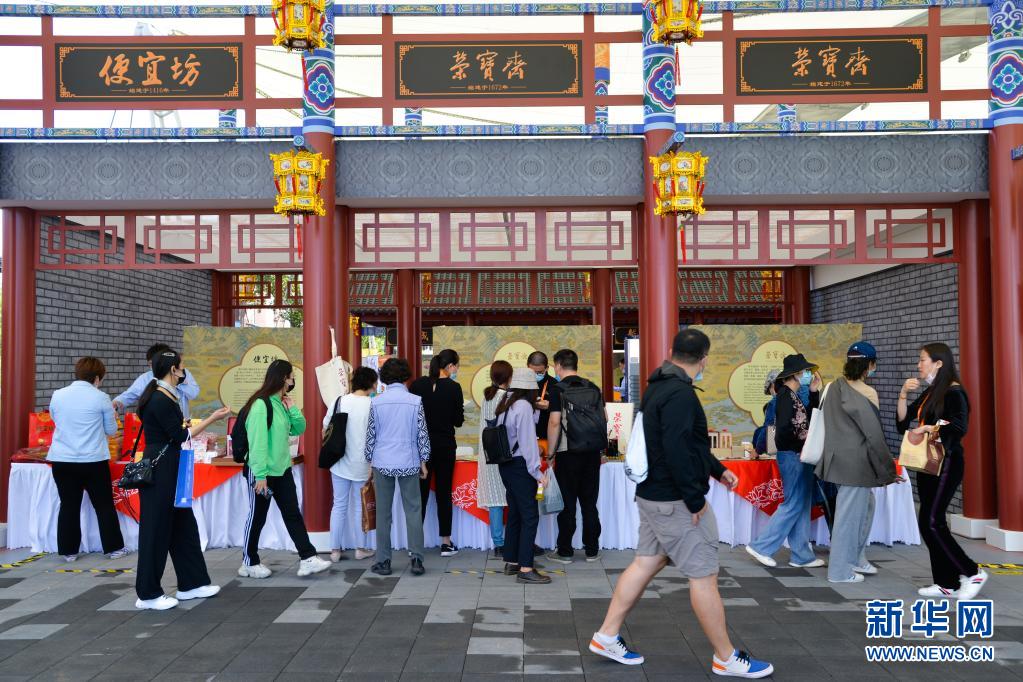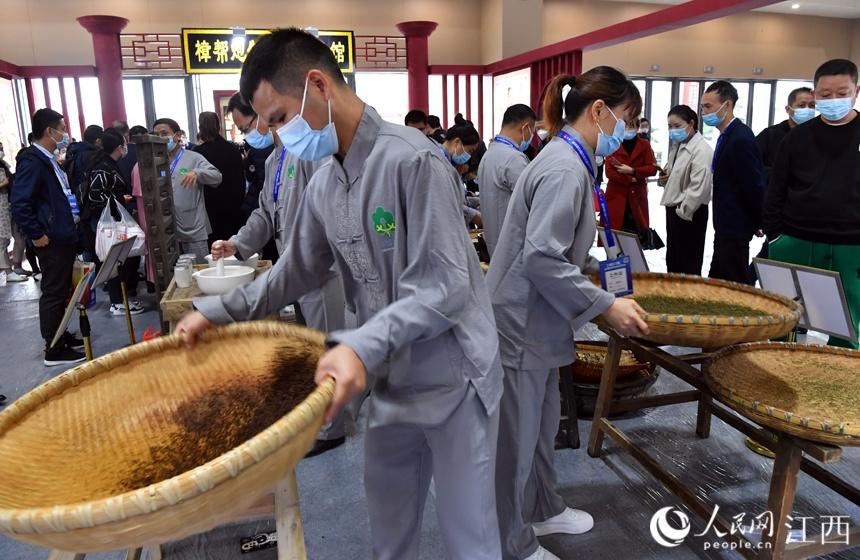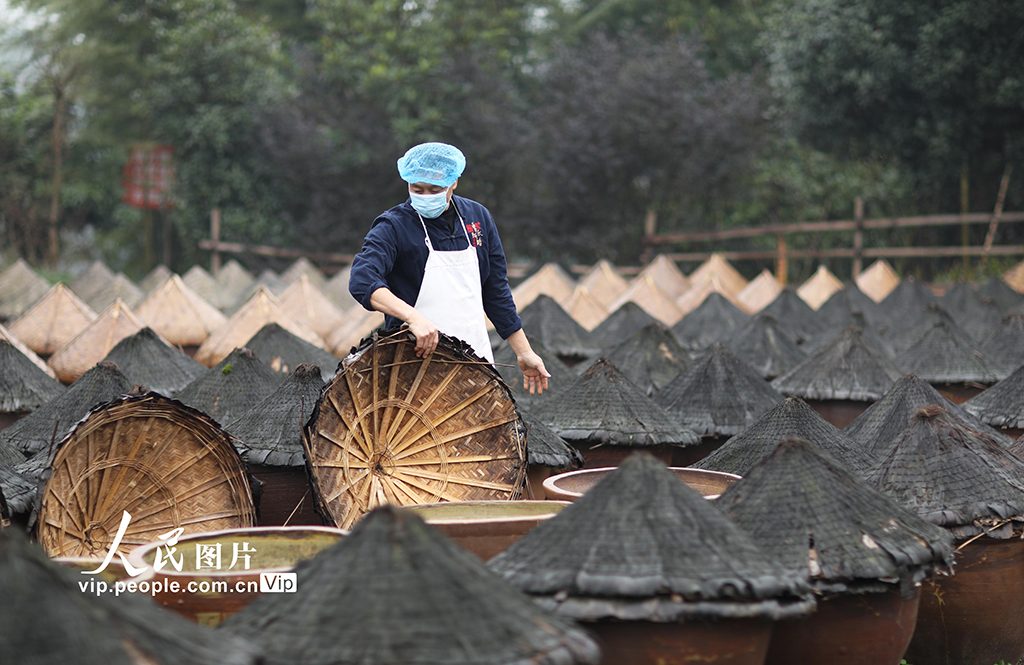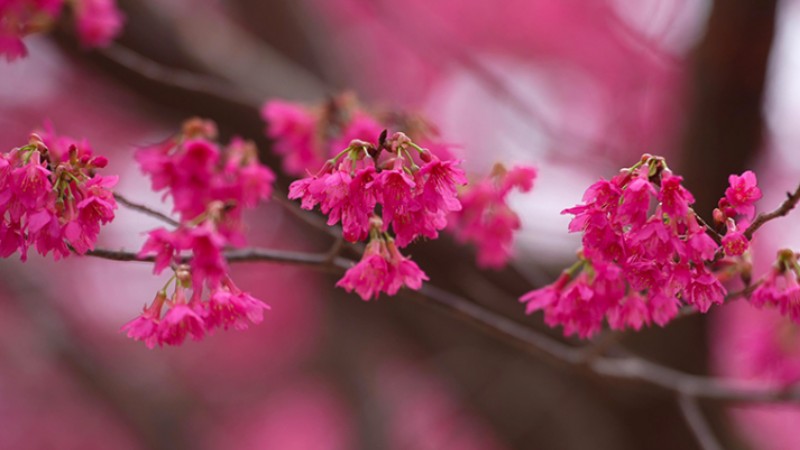Chinese time-honored brands take on new look
A circular urging closer interaction between Chinese time-honored brands and historical and cultural resources to boost consumption was released by the Ministry of Commerce, the Ministry of Culture and Tourism, and the National Cultural Heritage Administration.
The circular noted the importance of providing greater attention to the protection and utilization of historical and cultural resources by time-honored brands, and further integrating old brands with intangible cultural heritage, cultural relics and museums.
Old brands are expected to embrace more innovations and play a more active role in passing down fine traditional Chinese culture.
Records show China has 1,128 time-honored brands, of which nearly 800 companies engage in businesses related to intangible cultural heritage items, and 87 are listed as protection institutions of national representative intangible cultural heritage.
Ancient commercial street reflects modern vitality

Photo taken on Sept. 6, 2021 shows people visiting and shopping at a time-honored brands zone of the Shougang Park during the China International Fair for Trade in Services in Beijing. (Xinhua/Xu Qin)
Qianmen Street, a nationally-known commercial street, sits on the central axis of Beijing. The centuries-old street in Dongcheng district has witnessed the vicissitudes of the ancient city. In recent years, it has been restored with past glamour as well as memories.
The 840-meter-long street is now home to over 30 time-honored brands, making it a must-see for visitors eager to savor the authentic Beijing flavors.
Quanjude, a renowned roast duck restaurant, is one of them. It offers customers special cultural experiences, featuring “central axis culture” and “Beijing cuisine culture”.
“As a time-honored brand in this neighborhood, Quanjude strives to better fuse itself with Beijing culture through brand innovation,” said Song Shiwei, a manager of the restaurant.
Records show that since this year’s Spring Festival holiday, online transactions of Beijing’s major time-honored restaurants have risen by nearly 50 percent from a year ago.
Not far away from Quanjude’s outlet along Qianmen Street, crowds flock to a Wuyutai Tea shop. Among all tea products, a series of themed tea bags, whose name is inspired by the art painting "A Thousand Miles of Rivers and Mountains" created by Wang Ximeng of China's Northern Song Dynasty (960-1127), are especially popular among young consumers.
Officials of Dongcheng district have encouraged the upgrading of time-honored brands, the establishment of private museums, and development of cultural and creative products. They said this would revive local traditional culture and business ecology, and high-quality pedestrian streets with Beijing characteristics and modern vitality will be built, injecting sustained energy into commercial streets in the ancient capital.
Centuries-old pharmacy embraces new changes

Workers demonstrate how traditional Chinese medicine is made, in Zhangshu, east China’s Jiangxi Province. (People’s Daily Online/Shi Yu)
A demonstration on making traditional Chinese medicine (TCM) pills at the museum of Huqingyutang, a centuries-old pharmacy, in Hangzhou, east China’s Zhejiang Province, won public acclaim.
Ground powder of TCM soared through the air as a craftsman swung a flat round bamboo-woven basket. After repeating the action thousands of times, a host of similar-sized, compact round pills were produced.
Ding Guangming, the craftsman, has been working in the pharmacy for over 50 years, and is a provincial representative inheritor of TCM’s hand-making technique.
“Manually producing pills is energy-consuming and relies on one’s conscience,” Ding said, adding that the process needs materials in great quantity and quality, which consumes about one kilogram of medicine powder and nearly one hour to make a batch of pills.
Huqingyutang’s museum, an antique wooden building, is witness to the brand’s history since its founding in 1874 and also one of well-preserved ancient commercial building clusters of the late Qing Dynasty (1644-1911) in the country. The museum offers visitors not only views of medicine-making techniques but also a first-hand experience at the workshop.
The ancient architecture of the pharmacy was listed as a key historical and cultural site under national protection in 1988, and its TCM culture was included in the first batch of national intangible cultural heritage in 2006.
Over the past century, Huqingyutang has established a TCM supply chain that covers medicinal herb planting, patent medicine production, healthcare services, and cultural and tourism sectors.
The time-honored brands should “carry forward fine traditions but not stay unchanged, and try to break new ground but not forget their original aspirations”, which can help them explore and utilize historical and cultural resources and integrate into the new era, said Liu Jun, chairman of the pharmaceutical company.
Vinegar-making technique inheritor blazes new trail

A worker inspects the sunning field of a vinegar factory in Chishui, southwest China's Guizhou Province. (Photo/Wang Changyu)
Behind the gate of a vinegar factory in Chishui city, Zunyi, southwest China’s Guizhou Province, thousands of earthy-yellow jars form a magnificent spectacle, alongside the fragrance of vinegar, where the centuries-old craft of sun-drying vinegar has been sustained.
Chishui sun-dried vinegar gained its name from long exposure to sunlight. The finished product features a reddish brown color, a viscous and soft texture, and sour and slightly sweet flavor.
Zeng Quanlin, 46, is a provincial representative inheritor of the Chishui sun-dried vinegar making technique recognized as a national intangible cultural heritage.
Born in a family keeping this traditional craft alive, Zeng knows every step, including steaming, brewing, fermenting and sun-drying. A total of 12 steps and five rounds of natural fermentation are involved to produce a bottle of vinegar spanning over three years.
Zeng’s family vinegar business has lasted over a century, and is confirmed as a provincial time-honored brand.
“A time-honored brand should be rooted in profound culture, craftsmanship and past legacy,” Zeng said, adding that as industrial technologies have made great strides in the 21st century, new businesses boasting huge outputs, a short production cycle and automatic operation pose big challenges to traditional manufacturing enterprises.
Chishui Zengshi Sun-Drying Vinegar Co., Ltd., founded in 2012, aims to carry forward the history and culture of local sun-dried vinegar, build garden-style vinegar museums, and set up intangible cultural heritage education bases, blazing a new trail of combining traditional crafts with tourism.
Since the company’s factory opened to the public in 2019, it has received more than 200,000 visits, generating over 28 million yuan ($4.08 million).
“The intangible cultural heritage technique enables the company to become a time-honored brand. Looking ahead, the company can only move forward by passing on old legacy and promoting innovation,” said Zeng, also an employee of the company, noting he would keep exploring how to make old brands continue to shine.
Photos
Related Stories
- College student promotes traditional Chinese culture by creating delicate hair accessories
- Growing confidence among Chinese in traditional culture
- Chinese time-honored restaurant brands embrace revival
- A stalk of "Chinese grass" weaves its way to the world
- Emerging young talents carry forward traditional Chinese culture
Copyright © 2023 People's Daily Online. All Rights Reserved.









